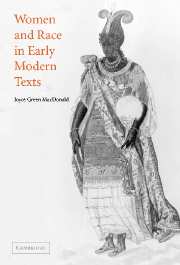Book contents
- Frontmatter
- Contents
- Acknowledgments
- Disclaimer
- Introduction: women, race, and Renaissance texts
- 1 Cleopatra: whiteness and knowledge
- 2 Sex, race, and empire in Shakespeare's Antony and Cleopatra
- 3 Dido and Sophonisba of Carthage: marriage, race, and the bonds between men
- 4 The disappearing African woman: Imoinda in Oroonoko after Behn
- 5 Race, women, and the sentimental in Thomas Southerne's Oroonoko
- 6 Chaste lines: writing and unwriting race in Katherine Philips' Pompey
- 7 The queen's minion: sexual difference, racial difference, and Aphra Behn's Abdelazer
- Conclusion: “The efficacy of Imagination”
- Bibliography
- Index
6 - Chaste lines: writing and unwriting race in Katherine Philips' Pompey
Published online by Cambridge University Press: 22 September 2009
- Frontmatter
- Contents
- Acknowledgments
- Disclaimer
- Introduction: women, race, and Renaissance texts
- 1 Cleopatra: whiteness and knowledge
- 2 Sex, race, and empire in Shakespeare's Antony and Cleopatra
- 3 Dido and Sophonisba of Carthage: marriage, race, and the bonds between men
- 4 The disappearing African woman: Imoinda in Oroonoko after Behn
- 5 Race, women, and the sentimental in Thomas Southerne's Oroonoko
- 6 Chaste lines: writing and unwriting race in Katherine Philips' Pompey
- 7 The queen's minion: sexual difference, racial difference, and Aphra Behn's Abdelazer
- Conclusion: “The efficacy of Imagination”
- Bibliography
- Index
Summary
Writing to her friend Charles Cotterell after the unauthorized 1664 publication of her poetry, Katherine Philips cites some lines from Edward Dering's “Epilogue” to the 1663 London edition of her translation of Corneille's La Mort de Pompée:
No Bolder thought can tax
These Rimes of blemish to the blushing Sex.
As Chast the lines, as harmless is the sense,
As the first smiles of infant innocence.
Eager to protest her literary virginity, Philips in fact slightly misquotes Dering; he actually wrote that the play's “Scenes” could not be taxed with blemishing the blushing sex, and that its “words” (not “lines”) were “chast”. The inaccurate transcription works to draw attention away from the fact that Pompey is a play, and not a poem, a literary work which possessed “Scenes” to be enacted and whose “lines” were intended to be closely memorized and recited by actors to a paying public rather than shared and reacted to by readers, or groups of readers.
Philips' letter to Cotterell itself undergoes a more deliberate editorial intervention when it was reprinted as one of the Letters from Orinda to Poliarchus in 1705, more than thirty years after her death. In this second version, the diction has been dignified and standardized; the first letter refers to the 1664 publication of Poems. By the Incomparable, Mrs. K. P. as “this most afflictive accident,” while in 1705 it becomes a “treacherous Accident,” for example.
- Type
- Chapter
- Information
- Women and Race in Early Modern Texts , pp. 124 - 143Publisher: Cambridge University PressPrint publication year: 2002



